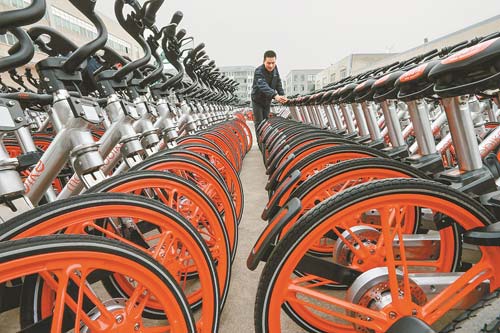Chengdu to add 100,000 public bikes in 2017
( chinadaily.com.cn )
Updated: 2017-02-10
 |
|
An employee at the Hunan plant of Foxconn Hongfujin Precision Industry Co. Hunan plant oversees production. [Photo/xinhuanet.com] |
An extra 100,000 public smart bicycles are set to hit the pavements of Chengdu in 2017, as the city’s moves towards ever-greener transport are taken up a gear.
First introduced last November, the Sichuan capital‘s fleet of two wheelers will hit a quarter of a million this year, run by six different operators, including Mobike, Blue-Gogo, and Panda Bicycle.
The smart system used to operate the bikes involves users downloading relevant apps such as Mobike which locates the nearest available public bike and unlocks it. Once users have arrived at their destinations, they can lock the bike at which point payment is automatically deducted via the app.
The new fleet of bikes are currently in production, a task being carried out at the Hunan plant of Taiwan manufacturer Foxconn Hongfujin Precision Industry Co.
The tremendous increase of public bicycles goes some way, but not all, in encouraging the public to take greener forms of transport, with many residents complaining that the current fleet of 100,000 bikes is still underused.
Chengdu local Yang Tao complained that many of the bikes were just sat gathering dust.
In response, the government and its partners are seeking to increase the public’s awareness of the true value and convenience of the new system.
Wang Dongquan, a spokesperson from Chinese bike-sharing startup Mobike, said that the launch of public bikes is in accordance with big data research, and guaranteed that more bikes would only be introduced into the areas where they are needed.
“The key points of this system are the sharing economy which is environment friendly and greater convenience,” said Lu Rongdong, deputy director of the Sichuan Economic Development Research Institute. “However, we need to be aware of preventing oversupply which could increase the city’s administrative burden.”
By Ge Jieru and edited by Owen Fishwick



